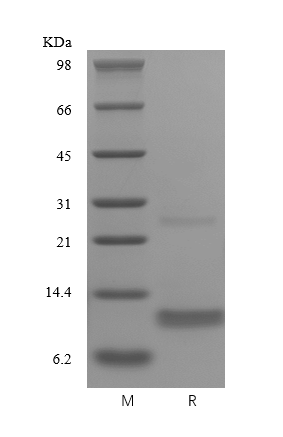- Synonyms
- G-26 T-lymphocyte-secreted protein, HC21, LAG-1, MIP-1-beta, PAT 744, Protein H400, SIS-gamma, Small-inducible cytokine A4, ACT-2
- Source
- Escherichia coli.
- Molecular Weight
- Approximately 7.8 kDa, a single non-glycosylated polypeptide chain containing 69 amino acids.
- AA Sequence
- APMGSDPPTA CCFSYTARKL PRNFVVDYYE TSSLCSQPAV VFQTKRSKQV CADPSESWVQ EYVYDLELN
- Purity
- > 96 % by SDS-PAGE and HPLC analyses.
- Biological Activity
- Fully biologically active when compared to standard. The biological activity determined by a chemotaxis bioassay using human peripheral blood monocytes is in a concentration range of 5.0-20 ng/ml.
- Physical Appearance
- Sterile Filtered White lyophilized (freeze-dried) powder.
- Formulation
- Lyophilized from a 0.2 μm filtered concentrated solution in 20 mM PB, pH 7.4, 150 mM NaCl.
- Endotoxin
- Less than 1 EU/μg of rHuMIP-1β/CCL4 as determined by LAL method.
- Reconstitution
- We recommend that this vial be briefly centrifuged prior to opening to bring the contents to the bottom. Reconstitute in sterile distilled water or aqueous buffer containing 0.1 % BSA to a concentration of 0.1-1.0 mg/mL. Stock solutions should be apportioned into working aliquots and stored at ≤ -20 °C. Further dilutions should be made in appropriate buffered solutions.
- Stability & Storage
- Use a manual defrost freezer and avoid repeated freeze-thaw cycles.
- 12 months from date of receipt, -20 to -70 °C as supplied.
- 1 month, 2 to 8 °C under sterile conditions after reconstitution.
- 3 months, -20 to -70 °C under sterile conditions after reconstitution.
- Usage
- This material is offered by Shanghai PrimeGene Bio-Tech for research, laboratory or further evaluation purposes. NOT FOR HUMAN USE.
- Reference
- 1. Irving SG, Zipfel PF, Balke J, et al. 1990. Nucleic Acids Res. 18:3261-70.
2. Cocchi F, DeVico AL, Garzino-Demo A, et al. 1995. Science. 270:1811-5.
3. Garlisi CG, Xiao H, Tian F, et al. 1999. Eur J Immunol. 29:3210-5.
4. Guan E, Wang J, Roderiquez G, et al. 2002. J Biol Chem. 277:32348-52.
- Background
- CCL4 encoded by the CCL4 gene, also known as Macrophage Inflammatory Protein-1β (MIP-1β) is a CC chemokine with specificity for CCR5 receptors and it is a major HIV-suppressive factor produced by CD8+ T cells. It is a monokine with inflammatory and chemokinetic properties. Recombinant CCL4 induces a dose-dependent inhibition of different strains of HIV-1, HIV-2, and simian immunodeficiency virus (SIV). Specifically, MIP-1-beta (3-69) is also a ligand for CCR1 and CCR2 isoform B. Recombinant human CCL4 contains 69 amino acids and it shares 77 % and 80 % a.a. sequence identity with murine and rat CCL4, respectively. Both human and murine MIP-1α and MIP-1β are active on human and murine hematopoietic cells.









 COA Application
COA Application


